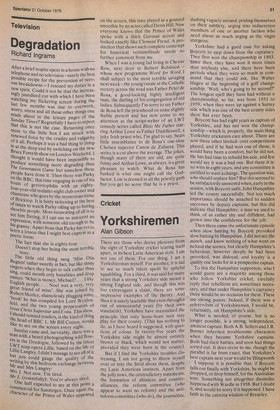Cricket
Yorkshiremen
Alan Gibson
There are those who derive pleasure from the sight of Yorkshire cricket tearing itself apart, in its best Latin American style. I am not one of them. For one thing, I am a Yorkshireman myself. For another, it is sad to see so much talent spoilt by spiteful squabbling. For a third, it was said for many years that a strong Yorkshire side meant a strong England side, and though this was too extravagant a claim, there are some impressive examples of the theory. And then it is surely laudable that even through a run of unsuccessful years (by their own standards), Yorkshire have maintained the principle that only home-born men may play for their county. (This has nothing to do, as I have heard it suggested, with questions of colour. In twenty-five years the Yorkshire side might be almost entirely brown or black, which would not matter, provided they were born in the county).
But if I find the Yorkshire troubles distressing, I am not going to throw myself over or into the Strid about them, despite my Latin American instincts. Apart from the jolly rows, the contradictory statements, the formation of alliances and counter alliances, the reform committee (who appear to want no reform) and the antireform committee (who do), the journalists, dashing vaguely around, priding themselves on their subtlety, urging into indiscretion members of one or another faction who need about as much urging as the virgin sturgeon.
Yorkshire had a good case for asking Boycott to step down from the captaincy. They first won the championship in 1893. Since then, they have won it more times than anybody else, and there have been periods when they were so much in command that they could ask, like Walter Hagen at the beginning of a golf championship, 'Well, who's going to be second?'
The longest spell they have had without a championship, so far, was from 1951 to 1959, when they were up against a Surrey side which was one of the best county sides there has ever been.
Boycott has had eight years as captain of Yorkshire, and has not won the champ ionship — which is, properly, the main thing Yorkshire cricketers care about. There are now three other limitedover competitions played, and if he had won one of those, it would have been a comfort, but he did not. He has had time to rebuild his side, and few would say it was a bad one. But there it is: no wins in eight years, and any committee is entitled to want a change. The question was, who should replace him? But this seemed to be satisfactorily answered when, early in the season, with Boycott unfit, John Hampshire led the county successfully. Not too much importance should be attached to sudden successes by deputy captains, but this did indicate that Hampshire, a man we used to think of as rather shy and diffident, had grown into the confidence for the job.
Then there came the unfortunate episode when slow batting by Boycott provoked slow batting by Hampshire. I did not see the match, and know nothing of what went on behind the scenes, but clearly Hampshire's behaviour, however deeply he had been provoked, was disloyal; and loyalty is a quality one looks for in a prospective captain. To this the Hampshire supporters, who I would guess are a majority among those who follow Yorkshire cricket, carefully reply that rebellions are sometimes necessary, and that under Hampshire's captaincy there would be no occasion for them. These are strong points. Indeed, if there was a referendum of Yorkshiremen, I would be, reluctantly, on Hampshire's side.
What is needed, of course, but is no longer possible, is a strong, independent, amateur captain. Both A.B. Sellers and J.R.
Burnet inherited troublesome characters when they became Yorkshire captains.
Both had their battles, and soon had things sorted out. It does occur to me, though the parallel is far from exact, that Yorkshire's best captain next year would be Illingworth I suppose it is possible that, if Boycott falls out finally with Yorkshire, he might be dropped, or drop himself, for the Australian tour. Something not altogether dissimilar happened with Wardle in 1958. But I doubt it, and would be sorry if it happened. I have faith in the calming wisdom of Brearley.






































 Previous page
Previous page